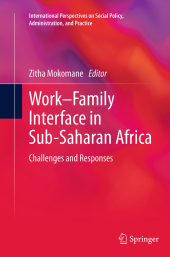 Neuerscheinungen 2016Stand: 2020-02-01 |
Schnellsuche
ISBN/Stichwort/Autor
|
Herderstraße 10
10625 Berlin
Tel.: 030 315 714 16
Fax 030 315 714 14
info@buchspektrum.de |

Zitha Mokomane
Work-Family Interface in Sub-Saharan Africa
Challenges and Responses
Herausgegeben von Mokomane, Zitha
Softcover reprint of the original 1st ed. 2014. 2016. xi, 216 S. 5 SW-Abb., 8 Tabellen. 235 mm
Verlag/Jahr: SPRINGER, BERLIN; SPRINGER INTERNATIONAL PUBLISHING 2016
ISBN: 3-319-34277-0 (3319342770)
Neue ISBN: 978-3-319-34277-1 (9783319342771)
Preis und Lieferzeit: Bitte klicken
This book examines issues affecting working women with families in Sub-Saharan Africa. It describes a range of strategies for resolving work-family friction and includes policy recommendations as first steps toward remedying longstanding challenges.
Problems associated with work-family conflict do not belong to individual families alone, but have a major social and economic impact on the greater community. This scenario also holds true across sub-Saharan Africa, as nations enter the global economy and rising numbers of women enter the workforce.
One of the first resources to focus on this region, Work-Family Interface in Sub-Saharan Africa probes rarely-studied dimensions of conflict between paid employment and family responsibilities. It balances theoretical background, empirical findings and current and emerging interventions for an insightful and practical review of ongoing issues affecting working women with families. Coverage contrasts concepts of work and family between the developing world and the West and related social concerns such as gender expectations and sexual harassment are examined in the work context. The book describes a range of family strategies for resolving work-family friction and chapters end with policy recommendations as first steps toward remedying longstanding challenges. Among the thought-provoking dispatches:
Ghana: Managing work and family demands
Nigeria: Strain-based family interference with work
Botswana: The social impact of job transfer policy on dual-career families
Kenya: The role of household help in work-family balance
South Africa: State measures toward work-care integration
Zambia: The quest for a family policy
As evinced by these chapters, progress is gradual and far from uniform. As a guide for future study and future policy, Work-Family Interface in Sub-Saharan Africa is a substantial reference for sociologists, public health professionals, public and social policymakers and administrators.
Part I Work-Family Interface as a Policy Issue in Sub-Saharan Africa.- Chapter 1 Introduction.-Chapter 2 Managing Work and Family Demands: The Perspectives of Employed Parents in Ghana.- Chapter 3 Work and family in a cross-cultural context: A comparative review of work-family experiences of working mothers in Australia and Zimbabwe.-Part II Factors Underlying Work-Family Conflict in Sub-Saharan Africa.-Chapter 4 Working hours and work-family conflict in the institutional context of Nigeria.- Chapter 5 Strain-Based Family Interference with Work: A Theoretical-Empirical Analysis from South-Eastern Nigeria.-Chapter 6 Sexual Harassment as a Contributory Factor in Work-Family Conflict: Implications for Policies in the Workplace.-Part III Impact on the Families.-Chapter 7 The Social Impact of Job Transfer Policy on Dual Career Families in Botswana.- Chapter 8 Workplace Changes and Its Implications for Work-Family Conflict and Gender Asymmetries in South Africa.-Part IV Coping Strategies.-Chapter 9 The Role of House Helps in Work-Family Balance of Women Employed in the Formal Sector in Kenya.- Chapter 10 The Quest for a Family Policy in Zambia.- Chapter 11 State Measures towards Work-Care Integration in South Africa.- Chapter 12 A Review of Work-Family Research in Sub-Saharan Africa.


